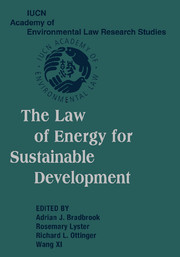Book contents
- Frontmatter
- Contents
- Acknowledgments
- Message from Kofi A. Annan, Secretary-General, United Nations
- Introduction – A Global Learned Society to Address Earth's Evolution: The IUCN Academy of Environmental Law
- Public Lectures on International Environmental Law
- PART ONE SUSTAINABLE DEVELOPMENT AND THE ROLE OF ENERGY LAW
- PART TWO LEGAL ISSUES IN CONTEMPORARY ENERGY LAW
- PART THREE INTERNATIONAL ENERGY LAW
- 11 International Law and Global Sustainable Energy Production and Consumption
- 12 Policy Options
- 13 Financing Energy for Sustainable Development
- 14 The Clean Development Mechanism and UNFCCC / Kyoto Protocol Developments
- 15 The Report of the World Commission on Dams: Some Implications for Energy Law
- 16 International Issues for Sustainable Development: IUCN Perspective
- 17 Enhanced Implementation and Enforcement of International Environmental Laws by the Judiciary
- PART FOUR COMPARATIVE ENERGY LAW
- PART FIVE ELECTRICITY RESTRUCTURING
- PART SIX FINANCING FOR SUSTAINABLE ENERGY
- PART SEVEN CIVIL SOCIETY AND THE PROCEDURAL REQUIREMENTS OF ENERGY LAW FOR SUSTAINABLE DEVELOPMENT
- Index
12 - Policy Options
Published online by Cambridge University Press: 10 August 2009
- Frontmatter
- Contents
- Acknowledgments
- Message from Kofi A. Annan, Secretary-General, United Nations
- Introduction – A Global Learned Society to Address Earth's Evolution: The IUCN Academy of Environmental Law
- Public Lectures on International Environmental Law
- PART ONE SUSTAINABLE DEVELOPMENT AND THE ROLE OF ENERGY LAW
- PART TWO LEGAL ISSUES IN CONTEMPORARY ENERGY LAW
- PART THREE INTERNATIONAL ENERGY LAW
- 11 International Law and Global Sustainable Energy Production and Consumption
- 12 Policy Options
- 13 Financing Energy for Sustainable Development
- 14 The Clean Development Mechanism and UNFCCC / Kyoto Protocol Developments
- 15 The Report of the World Commission on Dams: Some Implications for Energy Law
- 16 International Issues for Sustainable Development: IUCN Perspective
- 17 Enhanced Implementation and Enforcement of International Environmental Laws by the Judiciary
- PART FOUR COMPARATIVE ENERGY LAW
- PART FIVE ELECTRICITY RESTRUCTURING
- PART SIX FINANCING FOR SUSTAINABLE ENERGY
- PART SEVEN CIVIL SOCIETY AND THE PROCEDURAL REQUIREMENTS OF ENERGY LAW FOR SUSTAINABLE DEVELOPMENT
- Index
Summary
INTRODUCTION
Unsustainable patterns of energy use are harming the local and global environment. Global climate change is already making itself felt, from the thinning of the Arctic ice cap to the retreat of glaciers across the world, as well as in the emerging link between climate change and the increase in extreme weather events. At the same time access to safe and effective energy remains largely out of reach in many developing countries. Some two billion people, one-third of the world's population, rely almost completely on traditional energy sources, and are unable to take advantage of modern forms of energy, such as electricity, that are taken for granted in the developed world. For instance, in most of sub-Saharan Africa the electrification rate is as low as ten percent, falling even further in rural areas.
Energy consumption in developing countries, although growing rapidly, remains low in absolute terms (see Table 12.1). Access to modern energy for the poor will not be achieved without massive additional investment, which so far seems unforthcoming. Although the developing country share of energy consumption is low, it is set to grow dramatically – according to some calculations, from thirty percent in 2000 to forty-three percent in 2030 – with long-term consequences for sustainable development. Two important points can be made about the link between energy production and use and sustainable development. The first is the importance of adequate energy services for satisfying basic human needs, improving social welfare, and achieving economic development.
- Type
- Chapter
- Information
- The Law of Energy for Sustainable Development , pp. 202 - 221Publisher: Cambridge University PressPrint publication year: 2005



